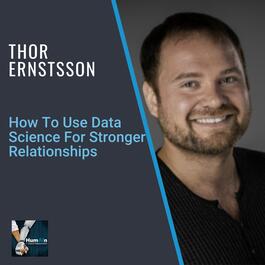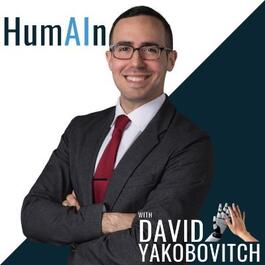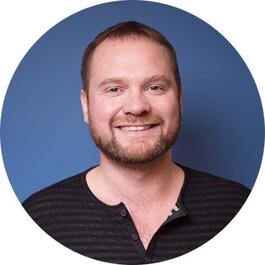
Thor Ernstsson: How To Use Data Science for Stronger Relationships
Thor Ernstsson: How To Use Data Science for Stronger Relationships [Audio] Podcast: Play in new window | Download Subscribe: Google Podcasts | Spotify | Stitcher | TuneIn | RSS Thor Ernstsson is the CEO of Strata, a company that helps customers invest in their networks, no matter how busy they are. Strata enables intelligent outreach recommendations that strengthen professional relationships. With their easy to use platform, clients become more thoughtful and helpful to the most important people in their network. Thor is also the founder of Feedback Loop, which companies use to build real time feedback loops with their target markets. Basically customer development delivered at scale. Used by half of the F100 as well as some of the best tech companies around. Thor previously served as CTO of Audax Health and lead architect at Zynga where helped build up Zynga's first remote studio. Thor and the team at Zynga created and released Frontierville as the company's most successful product launch at the time. Episode Links: Thor Ernstsson´s LinkedIn: https://www.linkedin.com/in/thorernstsson/ Thor Ernstsson´s Twitter: https://twitter.com/ThorErnstsson Thor Ernstsson´s Website: https://www.strata.cc/ Podcast Details: Podcast website: https://www.humainpodcast.com Apple Podcasts: https://podcasts.apple.com/us/podcast/humain-podcast-artificial-intelligence-data-science/id1452117009 Spotify: https://open.spotify.com/show/6tXysq5TzHXvttWtJhmRpS RSS: https://feeds.redcircle.com/99113f24-2bd1-4332-8cd0-32e0556c8bc9 YouTube Full Episodes: https://www.youtube.com/channel/UCxvclFvpPvFM9_RxcNg1rag YouTube Clips: https://www.youtube.com/channel/UCxvclFvpPvFM9_RxcNg1rag/videos Support and Social Media: – Check out the sponsors above, it’s the best way to support this podcast – Support on Patreon: https://www.patreon.com/humain/creators – Twitter: https://twitter.com/dyakobovitch – Instagram: https://www.instagram.com/humainpodcast/ – LinkedIn: https://www.linkedin.com/in/davidyakobovitch/ – Facebook: https://www.facebook.com/HumainPodcast/ – HumAIn Website Articles: https://www.humainpodcast.com/blog/ Outline: Here’s the timestamps for the episode: (00:00) – Introduction (01:24) – It starts in the very beginning in rural Iceland. I grew up on the Northern coast of Iceland, in a little fishing village. We're about 450 people in technology there, which is a little bit different than how we think of it today. But, in a roundabout way, we ended up in New York, 20 years in the US and 10 in New York and absolutely love it here. And the reason is primarily that there's so much creative energy around, exactly your topic. (03:34) – So what we were doing at Feedback Loop, the core of it is really you take a business question: Is this going to work, for example. Which is not a well-formed research question. So we have to translate it into the intent of the question. What you're intending to do is assess functionality or competitors features or price point or messaging or whatever it is. (07:13) – Because, even though you can only juggle in your mind, let's just say 150, and the number is a bit fuzzy, but let's say that it is 150. You interact with thousands of people throughout your career, and you go to a conference and you meet a bunch of great, interesting people that you want to stay in touch with. You have coworkers that you may have worked with five years ago, 10 years ago, doing either something really fascinating and you want to stay in touch, or they're just friends and you liked interacting with them and you want to stay in touch. (10:10) – Most people, when they first think about it, they're like: I want more out of my network. But when we interview, especially the more senior, and we interview people, what we learn is the same thing over and over. It's not that they want to get something out of their network. It's not that they want to know who they should reach out to for sale or for deal or for VC. You need to stay in touch with their LPs and stuff like that, but it's really more about giving back. (13:31) –You just highlight a perfect example, people can't actually track all the communication again. There are so many things that fall through. So what we do first is we start with a bunch of rules. So there's heuristics around what might be important. It's this sort of static analysis of your communication and your calendar of your stuff like that. And then what we learn over time is who's important to you. (17:30) – The COVID and just in general, digitization of everything and making everything Zoom makes this problem much worse, because before you would get a coffee, you would see somebody in person, you have all these nonverbal cues, you have all these triggers and all those memories that are way more than what you have when it's just pixels on a screen. (21:22) – We're helping you uncover the things you should be doing, even if you don't know what you should be doing. That's kind of the key here is that it's doing the thinking and the heavy lifting for you. You click to accept it. You can reach out. You can action it. You can say like create a task out of it, basically. So that if I say to you in an email, or if you just send many emails ago, like that you used to introduce me to other speakers or podcasts. (24:53) – There's a lot of really interesting work that has been done that we can leverage in your right, that like building this from scratch even 10 years ago would not be possible. It's everything from memory constraints on the actual servers. The fact that I can spin up a 90, it was a 96 or 92 core Amazon instance and just at the click of a button and trained a model. I couldn't have done that before. So it would have been prohibitively expensive and improvely hard, actually, it's just not wasn't there. (25:53) – So there's lots of ways that email threads end, then we're trying to figure out. Can we tell which ones are natural and which ones are effectively errors, where you were when you dropped the ball on something. It's a fascinating problem. We have millions of messages to train on where you can see this. This ended and this didn't, and then we've got to figure out, how do you know if it was intentional or not. (28:55) – It's a combination of things. So, it's definitely the chief of staff in that way, but, arguably, it's more like a social secretary. So it's like helping organize the most important relationships you have. So for example, if you're traveling to Chicago, who should you reach out to? Because I've started heuristics, so obviously people that live there, fine. Second, people you met last time you were there, fine. Third, people you've talked about meeting up with in Chicago. Maybe you will remember that maybe you have a super memory where you're not limited by only 150 relationships and you can actually classify all minus like 30,000 people. (32:37) – We have a few products that we launched: the recommendations where you get three recommendations every week, plus memes and so corporate communication seems to be working. So that's live now called Reconnect. So definitely go to Straddled that CC and sign up for that. Then we're going to be launching the broader platform that I'm talking about that has all these integrated triggers, and nudges, and juristics, and patterns like travel, list building, list sharing, all those things that I suspect just about everybody who's listening to this does right now, and it'd be great to hear feedback. Advertising Inquiries: https://redcircle.com/brands Privacy & Opt-Out: https://redcircle.com/privacy
From "HumAIn Podcast"




Comments
Add comment Feedback